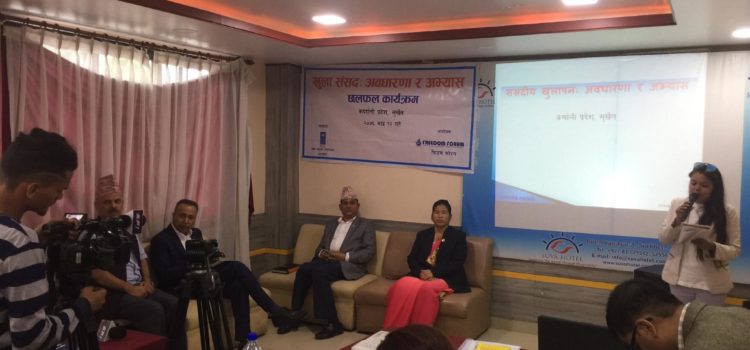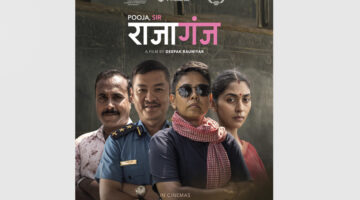In a bid to promote open parliament initiatives at province and federal levels, Freedom Forum held a discussion on ‘Open Parliament: Concept and Practices’ in Surkhet, the capital city of Karnali Province, on August 29.
At the discussion program attended by the lawmakers, government officials, media persons and advocates, FF Executive Chief Taranath Dahal observed that parliament was the forum for discussion on public issues, concern and policy and law making. The strong, active, efficient and open parliament was therefore essential to duly perform the legislative, representative and oversight functions more functional and effective, he noted.
Delivering his presentation on ‘Open Parliament: Concepts and Practices”, he highlighted four main components of the parliamentary openness, people (parliamentarians, employees and public), procedure (democratic functions), physical infrastructure (structures and software) and data, information and documents (creation, transmission and sharing).
He highlighted the concept and evolution of open parliament and its importance to empower citizens by ensuring accountability to the lawmaking platform. “Promoting culture of openness for effective democracy; making parliamentary information transparent as a greater commitment to transparency; easing access to information; enabling electronic communication for more Innovation and constant civic engagement for strong representation come under the scope of open parliament”, he noted.
According to him, the implementation of open parliament is relevant and essential indeed in Nepal in the view of eroding trust on participatory democracy. Open parliament advocates for vibrant civil society that constantly monitors the parliament activities. It is further pertinent also because of the federal system Nepal adopted by devising governments at three levels.
“The close watch on parliament by the aware citizens, academia, media, non-government organizations put pressure on the parliaments to be transparent by providing every information to the public and ensuring their say in the policy making”, he shared.
The presentation has put forth several future measures, including assessment of parliamentary law and practice, internalizing Open Parliament values, collaborative mechanism with CSOs, media and academia, joining OGP, engaging Civil Society in monitoring performance of parliamentarians and setting National Open Parliament Principles at federal and provincial levels.
Similarly, Policy Advisor at FF, Krishna Sapkota, underscored that open government builds trustworthy partnership between government and civil society. ‘Open Government Partnership (OGP) is a global initiative to promote listening government and good governance. It has the mission of securing concrete commitments from governments to increase accountability and responsiveness to citizens’ needs”, he noted.
OGP can be an important platform in Nepal for realizing the elevated level of interaction needed between civil society and government in order to build the trust needed for sustaining peace and pursuing a common agenda for change.
He also shared that as many as 79 countries, 20 local governments and large number of CSOs are the part of OGP to reform governance. Since its inception on September 2011, roughly 4,000 commitments have been made by different actors to make them more transparent and effective.
“Nepal is also already eligible to become the member of the global initiative based on the assessment criteria of access to information law, fiscal transparency practices, asset disclosure and citizen engagement. However, Nepal has not yet joined the OGP”, he highlighted.
Among other important working areas of OGP include democratic governance, citizen engagement, access to information, public service delivery, budget transparency, open data, public contracting, open parliament and judicial openness.
At the program, the Speaker at Karnali Province, Chief Secretary of Karnali government and Secretary of the parliament secretariat, said efforts were underway to make the parliament activities open.
Chief Secretary Kebal Bhandari appreciated the role FF played to percolate the OGP concept to the grassroots in Nepal. “There is nothing serious to keep budget secret because it needs huge discussion,” he said, adding that right to information was yet to be fully implemented to bring positive changes. RTI needs to be linked to development, he added.
He however admitted that the parliament was not spacious, so journalists’ entry was limited. But gradually, it would be spacious.
Meanwhile, the journalists showed huge concern that journalists were not allowed to enter the parliament and make reporting. The reporters to various media were univocal on why the Karnali government was delaying the establishment of media centre, so that it could be easy for them to report on government activities and decisions. Bill making process was secretive, they blamed.
Speaker Raj Bahadur Shahi reiterated that the parliament and the government would work in unison to set up the media centre. “This program would help a lot to make people’s representatives accountable and parliament activities transparent,” he hoped, adding that Karnali parliament was striving to make it participatory. According to him, the Province government had its own website for the disclosure of information, and even the parliamentary journalists’ association was formed in the Province.
On the occasion, advocate Ms Rama Pyakurel said the concepts of open parliament and open government were very important issues at present. Once it is implemented, citizens’ access to parliament would increase and help ensure open parliament, she added.
The program not only sensitized but also oriented the lawmakers on the concept and value of open parliament. It also boosted the morale of working journalists to prod parliament for transparency with the use of RTI.
The program was attended by 60 persons including parliamentary committee presidents, lawmakers, media persons, government officials, university teachers, legal practitioners, among others. The parliamentarians present on the occasion were Pushpa Gharti Bista (deputy speaker), Dharma Regmi, Yagya Bahadur BC, Thaneswor Bahadur Bista, Aman Thapa, Sushil Kumar Thapa, Amrita Shahi, Sita Nepali and Raju Nepali.





